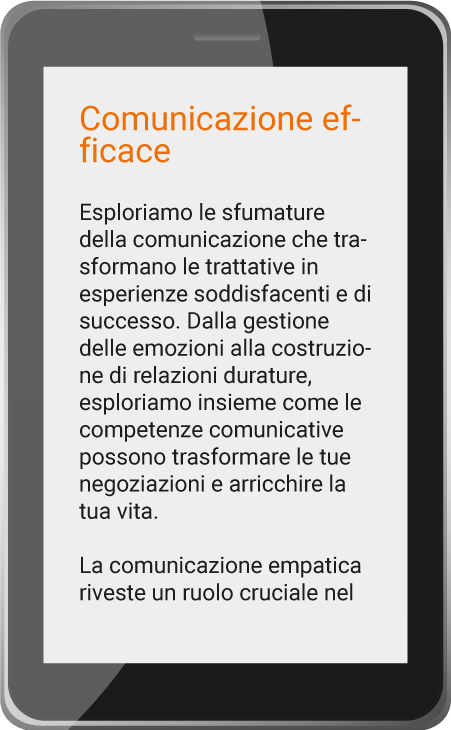Let’s explore the nuances of communication that transform negotiations into satisfying and successful experiences. From managing emotions to building lasting relationships, let’s explore together how communication skills can transform your negotiations and enrich your life.
Empathic communication plays a crucial role in the context of negotiations. This type of communication goes beyond mere words spoken during a negotiation and focuses on deeply understanding the thoughts, emotions, and perspectives of the other party involved in the negotiation.
It creates a human connection between the parties involved in the negotiation. Demonstrating empathy means actively listening to and understanding the needs, desires and concerns of the other party, thus helping to build trust and establish long-term relationships.
By practicing empathy, it is possible to grasp the true needs and motivations of the people involved in the negotiation. This in-depth understanding makes it possible to formulate offers and proposals that take into account the expectations and needs of the other party, thereby increasing the chances of reaching a mutually satisfactory agreement.
Empathic communication is a powerful tool for resolving conflicts that may arise during a negotiation. It allows misunderstandings, disagreements and tensions to be addressed constructively, promoting the overcoming of obstacles and the establishment of a more positive climate within the negotiating table.
Empathy promotes collaborative negotiation, in which all parties involved work together to find solutions that meet their mutual interests. This approach often leads to more lasting and beneficial agreements for all parties involved, creating value rather than merely distributing it.
Practicing empathy also involves clear and respectful communication. Listening carefully and respecting the opinions of others creates a negotiating environment in which each party feels heard and considered, thus fostering open and constructive dialogue.
And it is listening, and particularly active listening, that is a fundamental skill for building strong relationships and reaching agreements that are satisfactory to all parties involved. These skills go beyond the simple act of hearing the words of the other party and involve an active engagement in understanding the feelings, needs and perspectives of the other party.
Active listening is essential in negotiations because it allows one to gather important information about the other party’s needs, wants, and concerns. Fully understanding these aspects provides a solid basis for formulating offers and proposals that meet the real needs of the other party, thus creating fertile ground for a mutually beneficial agreement.
Listening demonstrates respect and consideration for the other party. When people feel heard and understood, an environment of mutual trust is created. Trust is crucial in negotiations, as people are more likely to cooperate and be flexible when they trust their counterparts.
This type of listening is critical in dealing with conflicts that may arise during a negotiation. Understanding the reasons behind disagreements helps to find creative solutions and overcome obstacles, leading to the resolution of difficult situations.
Communication cannot be effective without active listening. Fully understanding the other party’s point of view enables a more focused and empathetic response, fostering constructive dialogue. Clear and respectful communication is essential to avoid the emergence of misunderstandings.
Active listening becomes even more important in integrative negotiation. In this approach, the parties involved work together to maximize the value of the agreement by finding creative and innovative solutions that meet the interests of both parties. This leads to more satisfying and lasting results.
If listening is important, so are expository clarity and transparency, which are key pillars in building lasting relationships and obtaining fair agreements during negotiations. In a negotiating context, communicating clearly and transparently is crucial to ensure that all parties involved have a common understanding of the goals, expectations, and terms of the agreement. These are elements are essential and how they can positively influence the outcome of a negotiation.
Clarity of exposition concerns the ability to communicate in an understandable and unambiguous manner. During a negotiation, it is essential to set out one’s ideas, demands, and proposals clearly and coherently. Clear exposition avoids misunderstandings and misinterpretations, creating solid ground for discussion and mutual understanding.
When negotiating, it is important to avoid excessive use of technicalities or overly technical language that could confuse the other parties involved. Opting for clear and simple language helps everyone follow the discussion smoothly.
Organizing information logically and coherently makes it easier for everyone to understand. Use lists, diagrams or charts, if necessary, to present concepts in a visual and understandable way.
Transparency involves the open and honest disclosure of information relevant to the negotiation. It builds trust among the parties involved, fostering open dialogue and sharing of information crucial to informed decision-making.
The parties involved must be transparent in sharing information that could influence the decision of the other parties. This open sharing promotes mutual understanding and helps build trust.
During a negotiation, it is important to be transparent about one’s limits and goals. This transparency helps to set realistic expectations and avoid future disappointments.
Conveying clearly what realistic expectations are is essential to avoid misunderstandings. This helps to avoid situations in which either party feels deceived or disappointed after the agreement is concluded.
Conflicts are an inevitable part of negotiations. It is inevitable that disagreements will occur, but what really matters is how they are handled. Constructive conflict management is critical to maintaining the integrity of business relationships and reaching lasting agreements. That is why acquiring skills in this area is essential for any negotiator. Constructive conflict management can make all the difference in your negotiations.
Constructive conflict management encourages open and honest communication between the parties involved. Those involved are encouraged to express their concerns and viewpoints freely, creating an environment in which problems can be addressed before they escalate into more serious disputes.
A constructive approach to conflict is based on finding collaborative solutions. Instead of focusing on differences, the parties involved are encouraged to look for commonalities and to work toward creative solutions and to meet the interests of both sides. This approach leads to more lasting and mutually beneficial agreements.
Constructive conflict management aims to resolve differences without damaging business relationships. Resolving conflicts constructively and respectfully helps maintain the integrity of the relationship between the parties involved, fostering future cooperation and building mutual trust.
Resolving conflicts constructively contributes to a positive work climate. When people know they can deal with differences constructively, they feel more confident and encouraged to contribute to the negotiation process without fear of destructive conflict.
Every conflict resolved represents a learning opportunity. Analyzing how past conflicts were resolved can provide valuable lessons on how to handle similar situations in the future, thereby improving conflict management skills in the long term.
In the complex and dynamic world of negotiations, communication adaptability emerges as one of the most valuable skills for any negotiator. The ability to adapt one’s communication style in response to different situations, personalities, and cultures can make in the outcome of a negotiation.
Every culture has its own ways of communicating and interpreting nonverbal language. Communicative adaptability enables negotiators to understand and respect cultural differences, thus avoiding misunderstandings and offenses. It allows tone, language and attitude to be adjusted to reflect the specific cultural context.
People have different communication styles. Some prefer direct and assertive communication, while others may be more inclined toward diplomacy and cooperation. Communicative adaptability allows people to understand the other party’s way of communicating and adapt accordingly. This facilitates relationship building and negotiation of agreements that are satisfactory to all parties.
During negotiations, intense emotions and conflict can arise. Communicative adaptability enables negotiators to handle these situations with calmness and empathy. It allows them to use reassuring and respectful language to reduce tensions and find collaborative solutions.
Each negotiation is unique. Communicative adaptability allows the message to be tailored to the specific needs of the situation. This means presenting arguments and proposals in a relevant and persuasive way, taking into account the needs and interests of the parties involved.
Negotiations can be affected by external factors such as changes in the market, new laws, or changes in the economic situation. Communicative adaptability enables negotiators to react promptly to these situations, adjusting communication strategies to maintain control and steer the negotiation in the right direction.
Persuasive power must come to terms with ethics and wisdom. When we talk about ethical persuasion, we refer to the ability to positively influence others in the negotiation process, respecting their needs and interests.
Ethical persuasion begins with empathy and understanding the other party’s perspectives and needs. Listening carefully and understanding the other party’s concerns allows the persuasive message to be tailored to meet his or her specific needs.
When trying to persuade, it is essential to clearly communicate the benefits of the proposed agreement. Focusing on how the agreement will meet the other party’s needs and desires can increase the persuasiveness of the message. Presenting the benefits of the agreement clearly and tangibly can make it more likely that the other party will accept the proposal.
Being credible and trustworthy is critical for ethical persuasion. Transparency about the information presented and adherence to commitments made during negotiations builds trust. A persuasive party that acts with integrity and honesty will be seen as more trustworthy and will be able to positively influence the other party’s decisions.
Ethical persuasion means respecting the dignity and interests of those involved. Avoiding manipulative or coercive tactics is essential to maintaining the integrity of persuasion. Mutual respect during the persuasion process helps preserve long-lasting relationships and build a reputation as a reliable negotiator.
Ethical persuasion aims to create agreements in which both parties gain significant benefits from the agreement. Finding solutions that meet the interests of both parties is not only ethical, but also strategic in building lasting and profitable business relationships.
In addition to words, the way we express ourselves through our bodies, gestures, facial expression, and posture can convey powerful and subtle messages. Understanding and effectively using nonverbal communication can make a difference on the outcome of a negotiation.
The face is a mirror of human emotions. During negotiations, facial expressions can reveal sincerity, trust, uncertainty, or even distrust. Carefully observing your interlocutor’s expressions can give you valuable insights into his or her reactions to your proposals and arguments.
Hand gestures, postures and body movements can communicate intentions and feelings. A gesture of openness, such as outward, open hands, can indicate sincerity and helpfulness. On the other hand, a closed posture, such as crossed arms, may suggest defense or opposition. Knowing how to interpret these signals can help you adjust your negotiation strategy in real time.
Eye contact is one of the most powerful communication tools. Maintaining proper eye contact denotes trust and interest in the conversation. However, it is important to be aware of your interlocutor’s level of cultural and personal intimacy, as some may perceive prolonged eye contact as intrusive.
In addition to the words themselves, the tone and volume of your voice can convey emotions and intentions. A calm, confident voice may indicate confidence, while an uncertain or anxious voice may suggest indecision or insecurity. Adjusting your voice according to the situation can positively influence others’ perceptions of you.
When you tune into your interlocutor’s nonverbal communication, showing a slight reflection of his or her gestures and body language, you can create a sense of connection and rapport. This synchronization can help establish greater mutual trust and foster more open communication.
In the increasingly interconnected world of business, the ability to navigate through cultural and linguistic nuances is critical to success in international negotiations. Culture and diversity play a critical role in communication, influencing the expectations, social norms and beliefs of each party involved. Addressing these differences with sensitivity and understanding can determine the outcome of negotiations. Awareness of and adaptation to culture and diversity can foster productive dialogue and lasting business relationships.
Cultural variations can affect many aspects, including verbal and nonverbal communication, norms of politeness, social expectations, and even conceptions of time. A thorough understanding of these differences is essential to avoid misunderstandings and unintentional offenses.
Putting oneself in the other person’s shoes by understanding the cultural perspective can create a human connection and help build trusting relationships. Cultural empathy involves accepting differences without judgment, opening the mind and heart to understand and respect others’ beliefs and values.
Words and gestures can be interpreted differently in different cultures. Therefore, it is important to adapt language and gestures appropriately to your interlocutor’s culture. Avoid using idioms or specific humor that may not have the same meaning in other languages.
In some cultures, there is a strong social or corporate hierarchy that affects communication and decision making. Being aware of these dynamics can help you understand who the real decision makers are and how to establish effective communication with them.
Cultural differences can lead to unique perspectives and innovative ideas. Embracing these differences as opportunities to learn and grow can enrich the negotiation process, leading to more creative solutions and stronger partnerships.
In the context of global relations, continuing education on cultural diversity and cross-cultural communication is critical. Keeping yourself informed about cultural practices and relational dynamics in different parts of the world can increase your awareness and competence in managing cross-cultural negotiations.
In the context of negotiations, trust and consistency are the cornerstones on which successful relationships are built. Trust is the element that nurtures human connections and creates fertile ground for collaboration, while consistency represents the building of reliable and transparent communication. These two aspects are crucial in creating successful relationships and agreements
Trust is a foundation, upon which any successful relationship is built. In negotiations, when the parties involved trust each other, they are more likely to share crucial information, be open to proposals, and be willing to find shared solutions.
It is not earned overnight but requires time and consistency in behavior. Demonstrating competence, honesty and respect helps to gradually build mutual trust. Kept promises, reliable behavior and adherence to commitments are essential to strengthening trust over time.
In negotiations, the parties involved must take risks. Trust allows these risks to be taken in a calculated way, knowing that the other party will keep his or her commitments and abide by established agreements. This allows for a negotiating environment in which the parties can work together for maximum benefit.
While consistency is crucial in communication. It involves being clear, transparent, and consistent in the way information is presented and shared. Consistent communication helps to avoid misunderstandings and uncertainty, establishing solid ground for effective negotiations.
Consistency between what is said and what is done is critical. Verbal messages must be supported by corresponding nonverbal signals and concrete actions. When verbal, nonverbal, and behavioral communication are in sync, a feeling of trustworthiness and reliability is created.
In addition, consistency in the wording of offers and principles is essential. Inconsistently changing offers or principles during the negotiation process can undermine trust and make it difficult to reach a satisfactory agreement.
The conclusion of a negotiation is a crucial moment that requires skill, care and sensitivity. It is at this stage that agreements take shape, details are finalized, and the basis for a successful business relationship is established. Closing well is an art.
Thorough preparation is essential before entering the closing phase. Know well the details of the agreement, the needs and goals of both parties. Being prepared means being able to respond quickly to questions and concerns, thus demonstrating confidence and competence.
During the closing phase, it is important to manage expectations clearly and realistically. The parties involved must fully understand what they have agreed to commit to. Make sure that all details are clear and that there are no misunderstandings about the terms and obligations of the agreement.
Even if the main aspects of the agreement have been discussed, details often remain to be negotiated. These details may include payment terms, deadlines, special conditions, and so on. Clarity about these details is essential to avoid future conflicts and to ensure that the agreement is actually workable by both parties.
A good atmosphere during the closing phase is essential. Use positive and constructive language. Be courteous and respectful, even if disagreements over certain details occur. A collaborative approach can often overcome seemingly insurmountable obstacles.
Flexibility is an essential trait of a good negotiator. During the closing phase, you may have to reconsider some positions to reach a mutually satisfactory agreement. The art of closing a negotiation often involves finding common ground through compromise.
Once all aspects have been agreed upon, it is essential to document the agreement clearly and completely. This may include drafting a formal contract or letter of understanding outlining all the details of the agreement. Thorough documentation minimizes future misunderstandings and provides a solid foundation for future collaboration.
After official closing, it is helpful to send written confirmation of the agreement to all parties involved. This step provides a written record of the agreed terms and can help avoid future disputes. Periodic follow-up can also be useful to ensure that both parties are meeting their commitments.
Effective communication in negotiations is not only a professional skill, but also a powerful tool for personal growth. In addition to facilitating business deals, effective communication can contribute significantly to your personal growth, your interpersonal relationships, and your overall success in life.
Effective communication requires the ability to put yourself in the shoes of others, understanding their emotions, concerns and perspectives. This development of empathy not only improves your professional relationships, but also your ability to connect more deeply with people in your personal life.
Negotiation often involves intense emotions such as frustration, anxiety or disappointment. Learning how to manage these emotions constructively and deal with stressful situations through communication can improve your emotional intelligence and resilience.
Effective communication also requires self-awareness, that is, a clear understanding of your emotions, goals, and needs. This personal awareness can lead to higher self-esteem, better self-control, and greater confidence in social interactions.
Negotiation often involves conflict resolution. Through the practice of effective communication, you can develop strategies for dealing with conflict constructively, working toward solutions that satisfy all parties involved. This skill is valuable in your personal life, family, and workplace.
Being able to communicate clearly, assertively and respectfully can greatly increase your self-confidence. When you are confident in your communication skills, you feel more comfortable in social situations and are more likely to take both personal and professional initiatives.
Effective communication is critical to building strong and lasting interpersonal relationships. Knowing how to listen carefully, express yourself clearly, and resolve conflicts constructively can lead to more fulfilling and meaningful relationships in your personal and professional life.
Developing effective communication skills not only strengthens business negotiations, but also enriches your personal life. Empathy, emotion management, self-understanding and conflict resolution skills become pillars for meaningful personal growth. These skills not only open doors in the business world, but create deep and meaningful relationships, contributing to a fulfilling and successful life. Investing in your communication is investing in your personal and professional future.



